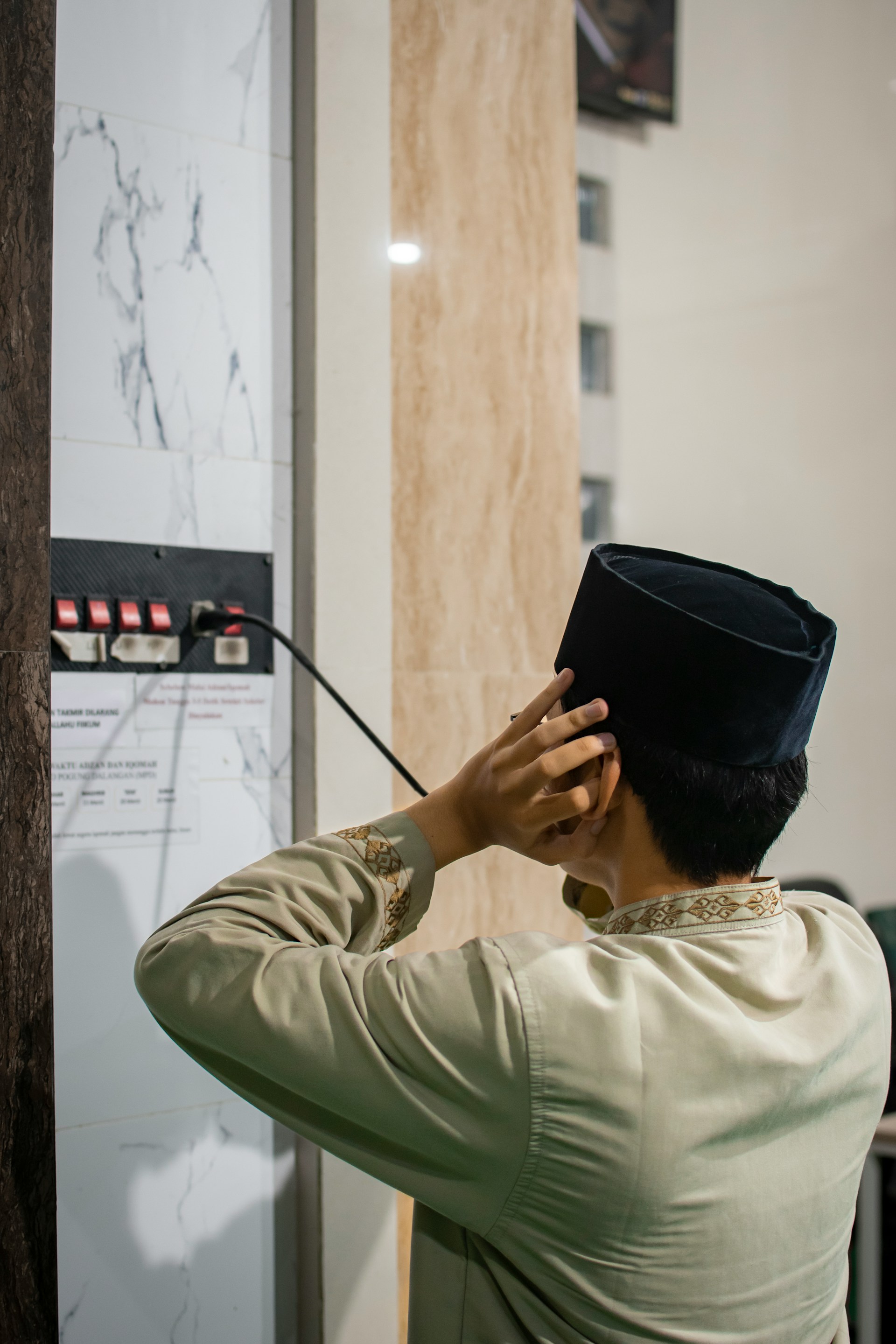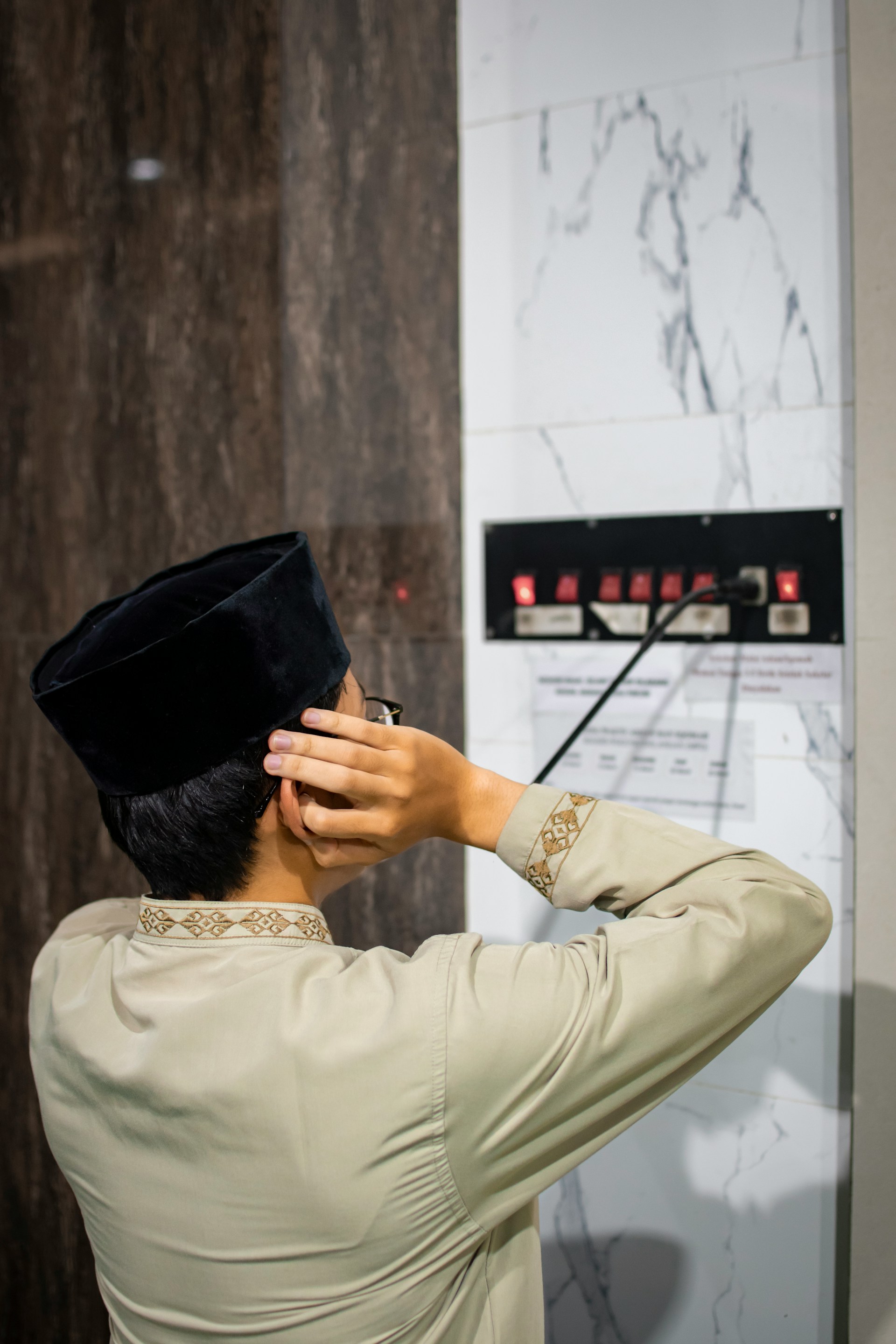Dreaming of hearing the adhan is a spiritual experience often encountered by many people, especially Muslims. This phenomenon has long been the subject of interpretation and study, both from religious and psychological perspectives. In this article, we will thoroughly discuss various aspects related to
dreaming of the adhan according to Javanese primbon, from definitions to in-depth interpretations from various viewpoints.
1. Definition of Adhan Dream

A man is calling to prayer (credit: unsplash)
Adhan dream can be defined as a sleep experience where someone hears or sees the process of the adhan being called. The adhan itself is a call to perform prayer in Islam. In the context of dreams, the adhan may appear in various forms and situations, but the essence of this dream is the presence of sound or visuals related to the call to worship.
Etimologically, the word "adhan" comes from Arabic meaning "notification" or "announcement". In everyday practice, the adhan is called five times a day as a marker for the start of obligatory prayer times. When someone dreams of the adhan, this experience often carries a deeper meaning than just a regular call to prayer.
It is important to note that the adhan dream can vary greatly from one individual to another. Some people may only hear the sound of the adhan faintly, while others may see themselves calling the adhan or being in a specific location when the adhan is announced. This variation can affect the interpretation and meaning of the dream.
2. The Spiritual Meaning of the Call to Prayer Dream According to Javanese Primbon
From a spiritual perspective, particularly according to Javanese primbon, dreaming of hearing the call to prayer is often considered a sign or message from the spiritual realm. Many believe that such dreams carry special meanings and can be a form of communication between humans and the divine dimension. Here are some spiritual interpretations of the dream of the call to prayer according to Javanese primbon:
- Spiritual Call: The dream of the call to prayer can be interpreted as a call to draw closer to God. It may be a sign that a person needs to improve the quality of their worship or enhance their spiritual relationship.
- Moral Reminder: The call to prayer in a dream can also be seen as a reminder to always maintain behavior and morals. This may arise when someone is facing an ethical dilemma or needs self-reflection.
- Sign of Protection: Some interpretations in Javanese primbon state that dreaming of the call to prayer is a sign of divine protection. This could mean that the person is under God's protection from danger or temptation.
- Symbol of Blessing: The call to prayer in dreams is also often regarded as a sign of forthcoming blessings or sustenance. This can manifest as spiritual or material advancement.
- Warning: In some cases, dreaming of the call to prayer can also be interpreted as a warning. There may be aspects of life that need attention or improvement.
The spiritual meaning of the dream of the call to prayer (adhan) according to Javanese primbon highly depends on the personal context and life circumstances of the dreamer. It is important to reflect on this experience in relation to the current life situation to gain a deeper understanding.
3. Types of Call to Prayer Dreams and Their Interpretations

A man is calling to prayer (credit: unsplash)
Dreams about the call to prayer can appear in various forms and situations. Here are some common types of adhan dreams along with their interpretations according to Javanese primbon:
- Hearing the Adhan from Afar: This dream is often interpreted as a spiritual call that has not yet been fully responded to. There may be aspects of spiritual life that need more attention. Javanese primbon interprets this as a sign that the dreamer will receive good news from someone they have not seen for a long time.
- Announcing the Adhan: If in the dream someone sees themselves announcing the adhan, this can be interpreted as a sign that the person has the potential to become a spiritual leader or role model for others. According to Javanese primbon, this dream can also mean that unexpected blessings will come.
- Adhan in Unusual Places: Dreaming of hearing the adhan in an unusual place (such as in a forest or in the middle of the sea) may indicate that spiritual messages can come from unexpected sources. Javanese primbon interprets this as a warning to be more vigilant about unusual things in life.
- Interrupted Adhan: If in the dream the adhan is heard as interrupted or cut off, this may reflect obstacles in spiritual life or doubts in faith. Javanese primbon interprets this as a sign of trials or challenges in life that need to be faced with patience.
- Repeated Adhan: A dream where the adhan is heard repeatedly may indicate the urgency to pay attention to the spiritual aspects of life. In Javanese primbon, this can be interpreted as a reminder to immediately improve one's relationship with God and fellow human beings.
Every type of adzan dream carries different nuances and interpretations. It is important to consider the personal context and feelings that arise when experiencing the dream to gain a more accurate understanding according to Javanese primbon.
4. Interpretation of the Call to Prayer Dream in Islam
In Islamic tradition, dreams are considered one of the ways Allah SWT communicates with His servants. The adzan dream, in particular, holds a special place in Islamic dream interpretation. Here are some interpretations of the adzan dream according to Islamic views:
- Sign of Goodness: Generally, dreaming of hearing the adzan is considered a good omen. This could mean that the person will receive good news or blessings.
- Reminder to Worship: The adzan dream is often interpreted as a reminder from Allah SWT to be more diligent in worship, especially in performing the five daily prayers.
- Symbol of Obedience: If someone dreams of calling the adzan, it can be interpreted as a sign that the person is a devout servant and close to Allah SWT.
- Spiritual Guidance: The adzan in a dream can also be seen as a form of guidance from Allah SWT in facing life's problems.
- Sign of Victory: Some scholars interpret the adzan dream as a sign of an upcoming victory or success in a matter.
In the book Tafsir Al-Ahlam by Ibn Sirin, it is mentioned:
" "
Meaning: "Whoever dreams that he calls the adzan, it indicates goodness and piety, and may also indicate the fulfillment of his needs."
It is important to remember that in Islam, dream interpretation is not an exact science. Dream interpretations should always be referred back to the Al-Qur'an and Hadith, and should not be used as the sole guide in making life decisions.
5. Symbol of the Call to Prayer in Dreams According to Javanese Primbon

A man is calling to prayer (credit: unsplash)
The call to prayer in a dream carries rich and diverse symbolism according to Javanese primbon. Understanding this symbolism can help in interpreting the meaning of dreams more deeply. Here are some symbolic aspects of the call to prayer in the context of dreams according to Javanese primbon:
- Divine Call: The call to prayer literally means a call to prayer. In a dream, this can symbolize a call from God to draw closer or to engage in introspection. Javanese primbon interprets this as a sign that the dreamer will receive guidance in their life.
- Spiritual Awareness: The sound of the call to prayer in a dream can symbolize the awakening of a person's spiritual awareness. This may indicate a new phase in one's spiritual journey. According to Javanese primbon, this can mean the arrival of enlightenment or new understanding in life.
- Time Reminder: The call to prayer, which is announced five times a day, can symbolize the importance of time management and discipline in life. Javanese Primbon interprets this as a reminder to value time more and use it wisely.
- Community and Unity: The call to prayer invites all believers to gather. In dreams, this can symbolize the need to connect more with the community or strengthen social bonds. Javanese Primbon interprets this as a sign of an important meeting or event that will unite many people.
- Self-Purification: The call to prayer invites one to purify themselves before prayer. In the context of dreams, this can symbolize the need to cleanse oneself spiritually or emotionally. According to Javanese Primbon, this could mean an upcoming opportunity for self-improvement or starting a new life.
The symbolism of the call to prayer in dreams according to Javanese Primbon can also vary depending on the specific elements that appear. For example, if the call to prayer sounds very loud, it may symbolize an urgent or important message. Conversely, a softly sounding call to prayer may symbolize a gentle call for introspection.
It is important to analyze this symbolism in the context of the dreamer's personal life and current situation. Every symbol can have different meanings for each individual, depending on their experiences and backgrounds.
6. Psychological Influence of the Call to Prayer Dream
Dreams about the adhan not only have spiritual meanings but can also have significant psychological influences on individuals who experience them. Here are some psychological aspects that may be related to dreams of the adhan:
- Subconscious Reflection: The adhan dream can be a reflection of someone's subconscious thoughts and feelings about spirituality or religion. It may indicate a need to pay more attention to the spiritual aspects of life.
- Anxiety or Guilt: Sometimes, dreams of the adhan manifest as expressions of anxiety or guilt related to religious obligations that may have been neglected. This can be a subconscious urge to pay more attention to religious practices.
- Need for Structure: The regular adhan in real life may appear in dreams as a symbol of the need for structure and routine in life. This may reflect a desire for a more organized and disciplined life.
- Search for Meaning: This dream can indicate that someone is in the process of searching for the meaning of life or spiritual purpose. The adhan in the dream may represent a call to find clearer direction and purpose in life.
- Resolution of Internal Conflict: The adhan in dreams may appear as a way for the subconscious mind to resolve internal conflicts between worldly and spiritual obligations. This can be a sign that someone needs to balance various aspects of their life.
- Increased Self-Awareness: The experience of dreaming about the adhan can trigger increased self-awareness and encourage someone to pay more attention to the spiritual aspects of their life. This can be a catalyst for positive change and personal growth.
From the perspective of Carl Jung's analytical psychology, the dream of the call to prayer can be seen as a manifestation of the 'spiritual archetype' in the human psyche. This may indicate a need to connect with the transcendent aspects of oneself or a search for deeper meaning.
It is important to note that the psychological interpretation of the dream of the call to prayer should always consider the personal and cultural context of the individual experiencing it. What may be significant for one person may have a different meaning for another.
7. Traditions Related to the Call to Prayer Dream in Javanese Culture

A man is calling to prayer (credit: unsplash)
In Javanese culture, especially related to primbon, dreams about the call to prayer have special significance. Some traditions and beliefs related to the dream of the call to prayer in Javanese culture include:
- Dream Recording Tradition: In some Javanese communities, there is a tradition of recording dreams that are considered important, including dreams about the call to prayer, to later discuss with elders or primbon experts.
- Prayer After Dream: There is a belief that after experiencing a good dream, including the dream of the call to prayer, one should pray in gratitude and ask for the goodness in that dream to manifest in real life.
- Sharing Dreams: In Javanese culture, there is a tradition of sharing dreams that are considered good, such as the dream of the call to prayer, with family or close friends as a way of sharing goodness and seeking interpretation.
- Collective Interpretation: In some Javanese communities, there is a practice of collective dream interpretation, where important dreams like the dream of the call to prayer are discussed together in groups or customary meetings.
- Thanksgiving Fasting: Some Javanese people choose to fast as a form of gratitude after experiencing a dream that is considered good, including the dream of the call to prayer. This is believed to strengthen the spiritual meaning of the dream.
- Pilgrimage: In Javanese tradition, the dream of the call to prayer can be seen as a signal to make a pilgrimage to places considered sacred or ancestral graves.
- Special Rituals: Some Javanese people may perform special rituals after experiencing the dream of the call to prayer, such as making offerings or meditating to gain further understanding of the meaning of the dream.
It is important to note that these traditions vary among regions and communities in Java. Not all Javanese people adhere to these practices, and interpretations can differ depending on family background and personal beliefs. It is always important to respect the diversity of interpretations and practices related to dreams in various Javanese traditions and cultures.
8. Comparison of Call to Prayer Dream Interpretations
The interpretation of the dream of the call to prayer can vary depending on the perspective and traditions used. Here is a comparison of the interpretations of the dream of the call to prayer from various viewpoints:
- Traditional Islamic Interpretation:
- Generally sees the dream of the call to prayer as a sign of goodness and closeness to Allah.
- Often interpreted as a call to enhance worship.
- Can also be seen as a sign of good news or sustenance coming.
- Javanese Primbon:
- Interprets the dream of the call to prayer as a sign of positive changes coming in life.
- Can be viewed as a reminder to pay more attention to spiritual aspects.
- Often associated with the arrival of sustenance or good fortune.
- Modern Psychological Perspective:
- May see the dream of the call to prayer as a manifestation of spiritual needs or a search for the meaning of life.
- Can be interpreted as a reflection of anxiety or internal conflicts related to religious obligations.
- May be considered a symbol of a call for introspection or change in life.
- Symbolic Approach:
- Interprets the call to prayer in dreams as a symbol of communication with the subconscious or spiritual dimension.
- Can see the call to prayer as a representation of the need for structure or discipline in life.
- Local Cultural Interpretation:
- In some local cultures in Indonesia, the dream of the call to prayer may be associated with local traditions or beliefs.
- Its interpretation can vary depending on the cultural context and customs of the region.
It is important to understand that there is no interpretation that is absolutely right or wrong. Each approach has its own value and context. In understanding the dream of the call to prayer, one may need to consider these various perspectives while also paying attention to their own personal and cultural context.
9. Differences Between Call to Prayer Dreams and Reality

A man is calling to prayer (credit: unsplash)
Although the dream of the call to prayer often feels very real, there are several important differences between this dream experience and hearing the call to prayer in reality. Understanding these differences is important for a more accurate interpretation:
- Context and Setting:
- Reality: The call to prayer is usually announced from a mosque or place of worship at predetermined times.
- Dream: The call to prayer can appear in unusual or even nonsensical locations and times, such as in the middle of a forest or underwater.
- Quality of Sound:
- Reality: The sound of the call to prayer is usually clear and consistent, with familiar tones and rhythms.
- Dream: The sound of the call to prayer may sound distorted, very loud, or even completely silent (only visual).
- Physical Response:
- Reality: Hearing the call to prayer usually prompts physical actions such as preparing for prayer or stopping activities.
- Dream: Physical responses may be limited or absent because the body is in a sleep state.
- Duration:
- Reality: The call to prayer has a relatively consistent duration, usually around 3-5 minutes.
- Dream: The duration of the call to prayer can be very short or feel very long, not corresponding to real time.
- Emotions and Feelings:
- Reality: Emotional reactions to the call to prayer are usually more controlled and familiar, such as feelings of calmness or being called to worship.
- Dream: It can evoke intense or unusual emotions, such as fear, excessive joy, or confusion.
- Spiritual Context:
- Reality: The call to prayer has a clear spiritual context directly related to worship and daily routines.
- Dream: The spiritual context may be more symbolic or abstract, not always directly related to worship.
- Consistency:
- Reality: The call to prayer has a consistent sequence and wording according to Islamic law.
- Dream: The call to prayer may have variations or changes in wording or order, and may even mix elements that are not present in the actual call to prayer.
Understanding these differences can help distinguish between dream experiences and reality, as well as provide better context for interpreting the call to prayer in dreams. It is important to remember that although dreams can feel very real, they are still products of the subconscious and do not always directly reflect reality.
10. Questions About the Call to Prayer Dream
Here are some frequently asked questions about dreaming of the call to prayer (adhan) along with their answers:
- Does dreaming of the adhan always mean something good?
Not always. Although it is generally considered a good sign, the interpretation of dreaming about the adhan highly depends on the context and the individual's feelings during the experience. Some interpretations even suggest that dreaming of the adhan could serve as a warning or a sign for self-reflection.
- What if I am not a Muslim but dream about the adhan?
Dreaming of the adhan can be experienced by anyone, regardless of religious background. For non-Muslims, this dream may reflect experiences or exposure to the sound of the adhan in daily life, or it could symbolize a broader spiritual calling.
- Is there a difference in meaning between hearing and reciting the adhan in a dream?
Yes, there is a difference. Hearing the adhan in a dream is often interpreted as receiving a message or spiritual call, while reciting the adhan can be understood as having a greater spiritual role or responsibility.
- What if the adhan in the dream sounds strange or distorted?
A strange or distorted adhan in a dream may reflect confusion or internal conflict regarding spiritual aspects of life. It may indicate the need for clarification or deeper understanding of one's beliefs or spiritual practices.
- Can dreaming of the adhan be a sign that something will happen in the future?
Some traditions do interpret dreaming of the adhan as a sign of upcoming events, such as good news or fortune. However, it is important not to rely too heavily on predictive interpretations and to focus more on self-reflection and the personal meaning of the dream.
- How should one respond appropriately after experiencing a dream of the adhan?
A good response is to engage in self-reflection, enhance your worship if you are a Muslim, or contemplate the spiritual aspects of your life.
Praying or being grateful can also be a positive response. If the dream is disturbing, consulting with a religious expert or psychologist can help.
Can the dream of the call to prayer occur repeatedly? What does it mean?
Yes, the dream of the call to prayer can occur repeatedly. This may indicate a message or unresolved issue in the spiritual aspect of your life. Recurrent dreams could be a sign to pay more attention to certain aspects of your spiritual or emotional life.
What if I feel scared or anxious when hearing the call to prayer in a dream?
Feeling scared or anxious when hearing the call to prayer in a dream may reflect anxiety or internal conflict related to the spiritual or religious aspects of your life. This might indicate the need for further exploration of the source of that anxiety, or there may be aspects of your spiritual practice that need attention.
Is there a relationship between sleep time and the likelihood of dreaming about the call to prayer?
There is no scientific evidence showing a direct relationship between sleep time and the likelihood of dreaming about the call to prayer. However, some people report experiencing this dream more often when sleeping close to dawn, which may relate to the proximity of the time to the dawn call to prayer in real life.
How can I distinguish between dreaming of the call to prayer and actually hearing the call to prayer while sleeping?
Differentiating between dreaming of the call to prayer and actually hearing the call to prayer while sleeping can be difficult. However, usually, if you wake up and the call to prayer is still ongoing, it might be a real call to prayer. Dreams of the call to prayer tend to stop when you wake up. Additionally, the call to prayer in dreams may have elements that are unrealistic or inconsistent with reality.
Understanding this FAQ can help provide a broader perspective on dreams of the call to prayer and how to respond to them. It is important to always remember that dream interpretation is highly personal and contextual.
11. The Influence of Culture on the Interpretation of Dreaming the Call to Prayer

A man is calling to prayer (credit: unsplash)
The interpretation of dreams involving the call to prayer is influenced not only by religious teachings or psychology but also by a person's cultural background. In the Javanese cultural context, specifically, dreams of the call to prayer have several unique nuances of interpretation:
- Cultural Syncretism: In Javanese culture, which often combines Islamic elements with local beliefs, dreams of the call to prayer may be interpreted considering Javanese mystical aspects. For example, the call to prayer in a dream may be seen as a message from ancestors or other spiritual entities.
- Kejawen Concept: In Kejawen philosophy, dreams of the call to prayer can be viewed as signs of balance between the material and spiritual worlds. This may be interpreted as a call to maintain harmony in life.
- Time Symbolism: In Javanese understanding, certain times have special meanings. Dreams of the call to prayer at specific times (such as midnight or dawn) may have different interpretations.
- Relationship with Nature: Javanese culture has a close relationship with nature. Dreams of the call to prayer occurring in certain natural locations (such as mountains or the sea) may have meanings related to the forces of nature.
- Role in Society: The interpretation of dreams of the call to prayer can also be linked to a person's role in society. For example, for a leader or community figure, this dream may be seen as a call to pay more attention to the spiritual well-being of the community.
- Rituals and Traditions: In some Javanese communities, dreams of the call to prayer may trigger the execution of certain rituals or traditions, such as celebrations or pilgrimages to places considered sacred.
- Concept of Destiny: In the Javanese view of destiny or "fate," dreams of the call to prayer may be seen as guidance about a person's life direction or significant events that will occur.
- Collective Interpretation: In some regions of Java, dream interpretation can become a collective activity, where the meaning of the dream of the call to prayer is discussed together in the community, providing a social dimension to personal experience.
It is important to remember that these cultural interpretations can vary greatly among individuals and communities. In a modern context, where many Javanese people are also exposed to global and scientific understanding, the interpretation of the adhan dream may be a blend of traditional and modern understandings.
12. A Scientific Approach to the Dream of the Call to Prayer
Although the adhan dream is often interpreted from a spiritual or cultural perspective, a scientific approach can also provide interesting insights into this phenomenon. Here are some scientific aspects related to the adhan dream:
- Dream Neuroscience: Neuroscience research shows that dreams occur during the REM (Rapid Eye Movement) sleep phase. During this phase, the brain is highly active and can produce complex sensory experiences, including sounds like the adhan.
- Information Processing Theory: According to this theory, dreams are a way for the brain to process and integrate information received during waking states. The adhan dream may reflect the processing of experiences or information related to religion or spirituality in daily life.
- Cognitive Psychology: The cognitive approach views dreams as reflections of thinking processes and problem-solving. The adhan dream may be a manifestation of thoughts or concerns about religious obligations or the search for spiritual meaning.
- Activation-Synthesis Theory: This theory posits that dreams are the result of random brain activity that is then synthesized into a coherent narrative. In this context, the sound of the adhan in the dream may just be a coincidence that the brain then ascribes meaning to.
- Environmental Influences: Studies show that external stimuli during sleep can influence dream content. If someone sleeps in an environment where the adhan is often heard, this may increase the likelihood of dreaming about the adhan.
- Memory and Experience: Psychological research indicates that dream content is often related to stored experiences and memories. The frequency of dreams about the call to prayer may be higher in individuals who are often exposed to or have a strong emotional connection to the call to prayer.
- Comparative Studies: Cross-cultural research on dreams can provide insights into how cultural and religious backgrounds influence the frequency and interpretation of dreams about the call to prayer.
- Statistical Analysis: Statistical studies on the frequency and patterns of dreams about the call to prayer in different populations can provide an understanding of the factors that influence the occurrence of these dreams.
This scientific approach is not intended to diminish the spiritual or cultural value of dreams about the call to prayer, but rather to provide an additional perspective that can enrich our understanding of this phenomenon. The integration of scientific understanding and traditional interpretation can offer a more comprehensive view of the meaning and significance of dreams about the call to prayer in human life.
13. Psychological Implications of the Dream of the Call to Prayer

The atmosphere in the mosque during the call to prayer (credit: unsplash)
Dreams about the call to prayer (adhan) can have various psychological implications that are interesting to explore. Here are some psychological aspects that may be related to the experience of dreaming about the adhan:
- Reflection of Spiritual Needs: Dreams of the adhan may reflect an unconscious need for a deeper spiritual connection. This could indicate that someone feels less connected to the spiritual aspects of their life and is unconsciously seeking ways to fulfill this need.
- Manifestation of Anxiety: In some cases, dreams of the adhan can be a manifestation of anxiety related to religious or moral obligations. This may indicate feelings of guilt or worry about not meeting the expected spiritual standards.
- Individuation Process: In Jungian psychology, dreams of the adhan can be seen as part of the individuation process, where an individual strives to integrate various aspects of their personality, including the spiritual aspect, into a coherent whole.
- Coping Mechanism: Dreams about the adhan may serve as a coping mechanism, providing a sense of calm or structure when facing stressful or uncertain life situations.
- Exploration of Identity: For individuals experiencing an identity crisis or searching for meaning in life, dreams of the adhan can be an unconscious way to explore aspects of identity related to religion and spirituality.
- Resolution of Internal Conflicts: This dream may arise as an effort by the subconscious mind to resolve internal conflicts between worldly and spiritual obligations, or between personal beliefs and social expectations.
- Indicator of Change: In the context of developmental psychology, dreams of the adhan can signify a transitional phase in life, where an individual begins to pay more attention to spiritual aspects or seeks deeper meaning.
- Reflection of Past Experiences: Dreams of the adhan may also be a way for the brain to process and integrate past experiences related to religion or spirituality, especially if those experiences had a significant emotional impact.
Understanding the psychological implications of dreams about the adhan can assist individuals in the process of introspection and self-development. This can be a starting point for further exploration of spiritual needs, personal values, and life goals. However, it is important to remember that psychological interpretations should always consider the personal and cultural context of the individual experiencing the dream.
14. The Influence of the Dream of the Call to Prayer on Daily Behavior
The experience of a dream about the call to prayer can have a significant impact on a person's behavior and attitude in daily life. Here are some ways in which a dream about the call to prayer might influence behavior:
- Increased Spiritual Awareness: After experiencing a dream about the call to prayer, a person may feel compelled to pay more attention to the spiritual aspects of their life. This could involve an increase in the frequency of worship, meditation, or self-reflection.
- Change in Priorities: This dream may cause someone to reevaluate their life priorities, perhaps by dedicating more time and energy to activities related to spiritual development or serving others.
- Increased Empathy: Some people may feel an increase in empathy and concern for others after having a dream about the call to prayer, viewing it as a call to pay more attention to the needs of others.
- Stress Management: A dream about the call to prayer can serve as a reminder to take a moment away from daily routines to pray or meditate, which can help in stress management.
- Change in Habits: A person may be motivated to change negative habits or adopt new habits that are more in line with their spiritual values after experiencing this dream.
- Search for Meaning: A dream about the call to prayer can trigger a deeper search for meaning in life, encouraging someone to explore existential or philosophical questions.
- Increased Awareness of Time: Since the call to prayer is a call to pray at specific times, this dream may enhance a person's awareness of the importance of time management and self-discipline.
- Strengthening Identity: For some people, a dream about the call to prayer can strengthen their religious or spiritual identity, perhaps encouraging them to be more open about their beliefs or more active in their religious community.
It is important to note that the influence of a dream about the call to prayer on daily behavior can vary significantly among individuals. Some people may experience dramatic changes in their behavior and outlook on life, while others may only feel more subtle or temporary effects. Factors such as cultural background, level of religiosity, and personal context will influence how someone responds to and integrates the experience of a dream about the call to prayer into their daily life.
15. Conclusion

The mosque's loudspeaker is calling to prayer (credit: unsplash)
Dreaming of hearing the adhan is a complex and meaningful spiritual experience. From the perspective of Javanese primbon, this dream is often considered a sign of goodness and closeness to the spiritual dimension. However, its interpretation can vary depending on personal context, culture, and life situations.
Some important points that can be concluded from this discussion include:
- The dream of the adhan can have various meanings, ranging from a spiritual call to a reflection of anxiety or internal conflict.
- The interpretation of this dream should be done by considering personal context and not taken literally.
- The dream of the adhan can be a catalyst for self-introspection and improvement of spiritual quality.
- It is important to differentiate between dream experiences and reality, even though both can feel very real.
- The response to the dream of the adhan should be positive, such as being grateful or increasing worship, without relying too much on predictive interpretations.
- A scientific and psychological approach can provide additional insights into the phenomenon of the adhan dream, complementing traditional and spiritual interpretations.
- The influence of the adhan dream on daily behavior can vary, but it often encourages increased spiritual awareness and positive changes in life.
Ultimately, the meaning of the adhan dream is very personal and subjective. The most important thing is how someone reflects on and integrates this dream experience into their daily life. Whether it becomes a motivation to improve worship, encourages self-introspection, or simply serves as a reminder of the spiritual dimension in life, the adhan dream can be a valuable and meaningful experience for anyone who experiences it.
Find other interesting reviews at kapanlagi.com. If not now, when?
(kpl/psp)
Disclaimer: This translation from Bahasa Indonesia to English has been generated by Artificial Intelligence.




















